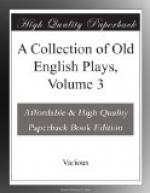This courtship Pembrooke knowes, but idle love,
The sick-fac’t object of an amorous brayne,
Did never clothe mine eye-balls, never taught
This toung, inurde to broyles and stratagems,
The passionate language of a troubled heart:
I am too blunt and rude for such nice service.
Yet since my friend injoynes me to this taske,
Take courage, Ile both speake, plead, woo for thee,
And when I want fit words to move her mind
Ile draw my sword and sweare she must be kind.
Drummer, report our presence to the king.
A parley and answered.
Enter France, Flaunders
and attendants.
Lew. Prince Ferdinand and honourd
English Pembrooke,
Now by S. Denis welcome! One runne straight
And give our daughter notice of these ghests.
What, man? we know you come prepar’d to woo,
To woo, to winne: now by our sacred life
We wish in soule our daughter were your wife.
Our sonne is with your sister: faire hap wayt,
For peace or war lives in your love or hate.
Welcome once more: first weele go see your love,
After to banquet and from thence to woo.
Be merry then; weele share a friendly part,
But you shall tryumph in our daughter’s heart.
[Exeunt.
[SCENE 3.]
Enter Katharine, her man Bowyer, and a Paynter.
Kath. See that the tent be ready furnished
By this my father and those Lords are met,
Mongst whom the noble Pembrooke, like the Sunne,
Out-shines the borrowed glory of the rest.
And well I may compare him to the Sunne,
That but once lookt upon with his fayre shape
Hath dazled my poore sences and left me blind.
But, sirra, where’s the man I bade you bring?
Bow. If you can judge of colours (madam) this is he. Paynter, stand forth.
Kath. An earnest cause (my friend) importunes me, Wherein I am to crave thy cunningst Arte.
Payn. Such as it is you may commaund, faire Princesse.
Kath. But are thy colours fresh, thy pensill
smoothe?
Thy hand unwavering, and thy head dislodg’d
Of all unquiet harsh incumbrances?
For thou must draw proportion of those parts
Whose worth to tell my toung wants utterance.
Payn. Feare you not, Madam; I am well prepar’d.
Kat. Then hither strait with youthfull Ferdinand, Navar’s stout sonne, there comes an English Knight, Pembrooke they call him, honourably borne. Him (when we are in conference) thou shalt marke And to the life set doune his counterfet. Nor is it needful I should shew him thee! The goodliest person in the traine, that’s he.
Bow. Let me alone to give the Paynter destruction. I know him as well as the Begger knowes his dish[113]: he weares a white Scarfe in his hat and an Orange tawny feather upon his arme.




